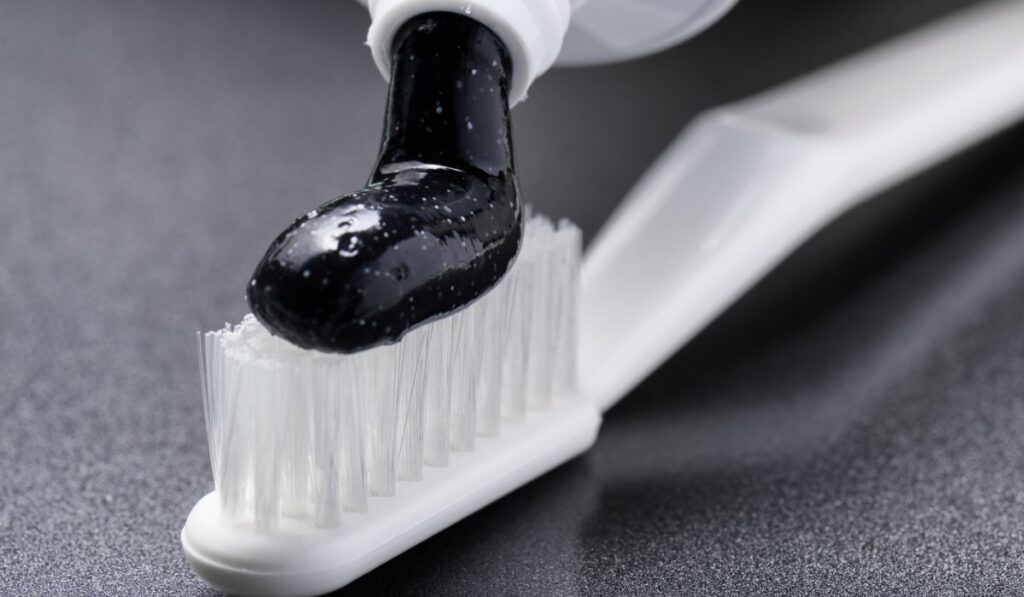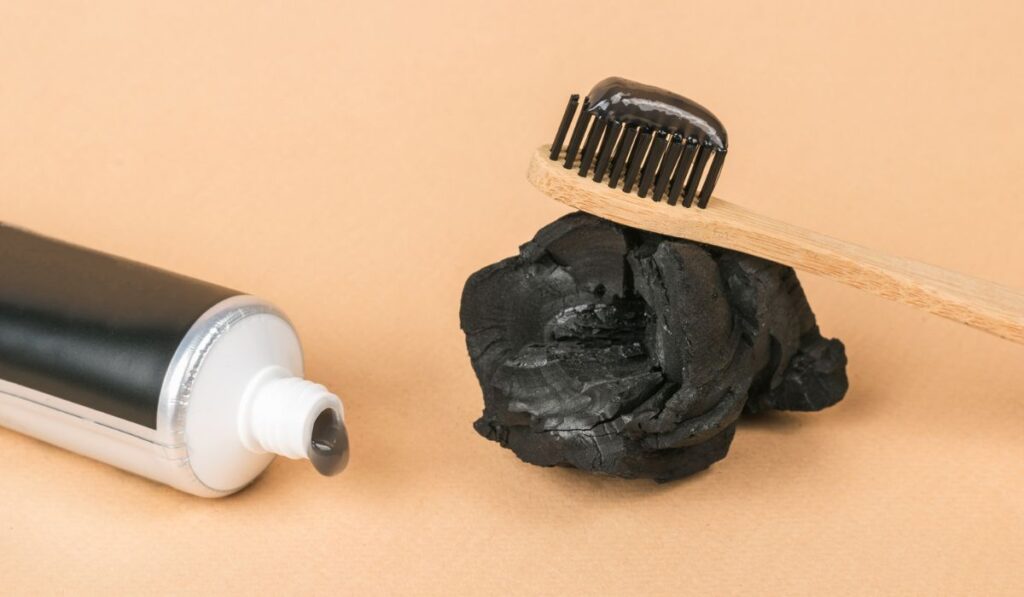Over the years, the use of charcoal toothpaste to whiten teeth has raised some serious dental health concerns, despite its apparent popularity. Charcoal toothpaste may seem like a great idea until you realize that the product may do more than just remove stains from your teeth. It can have negative effects as well.
Charcoal toothpaste may irritate your gums if you use it for extended periods of time, and if you have underlying dental health problems like gum recession, it can do more harm than good. The tiny particles of activated charcoal can lodge into gum lesions, causing irritation and gum sensitivity.
Let’s take a closer look at how charcoal toothpaste works and its potential side effects, so that you can decide if it’s the right product for you.
What Is Charcoal Toothpaste?

Charcoal toothpaste (on Amazon) is a special kind of toothpaste containing activated charcoal. “Activated” in this case means the charcoal is treated with oxygen at high temperatures. This makes it more porous — and therefore suitable for attracting and absorbing particles of other substances.
The use of charcoal for brushing teeth is an old concept, dating back to ancient Roman times. Activated charcoal also has modern applications in medicine. For example, it comes in handy for treating overdoses and poisoning.
When used in toothpaste, activated charcoal lends the toothpaste its abrasive properties. Most people believe this is good for scrubbing off the tough stains on teeth, thereby whitening them.
However, dentists strongly advise against using charcoal toothpaste because there’s limited scientific evidence of its effectiveness. In fact, the use of charcoal toothpaste and other abrasive-related teeth whitening methods can take a huge toll on your overall oral health. Thus, it is important to consider the safety of charcoal toothpaste before deciding to use it.
Can Charcoal Toothpaste Irritate Gums?
As it turns out, the vigorous scrubbing effect of charcoal can erode the gums, increasing gum sensitivity. Charcoal toothpaste removes stains from the teeth through mechanical rather than chemical means.
Curiously, the abrasive nature of activated charcoal makes it wear down the tooth enamel fast. This can potentially expose the soft, delicate tissue called dentin, increasing tooth sensitivity.
Things to Know Before Trying Charcoal Toothpaste
While charcoal toothpaste brands boast a miraculous whitening effect, experts warn that you should be very careful when using this product. These are the four things you should know before using charcoal toothpaste:
Avoid Long-Term Use of Charcoal Toothpaste
Dentists recommend you only brush with charcoal toothpaste once per week if you feel you must use it. Regardless of how appealing its effects are to you, you shouldn’t stick with it for long.
Re-Examine Your Dental Health History
Depending on your health history, you may not be suited to use charcoal toothpaste.
If you have receding gums, fine charcoal grains can get stuck in lesions and small cuts on your gums. This can increase gum irritation and sensitivity.
Charcoal toothpaste also rapidly wears down the tooth enamel for people with thin enamel. This makes your teeth more sensitive and increases the risk of cavities.
The tiny charcoal grains in charcoal toothpaste also worsen tooth decay if they get into fillings and small cracks in teeth.
Charcoal Toothpaste Can Lead to Yellow Teeth
Activated charcoal in toothpaste can lead to yellowing of teeth. The abrasive action of charcoal makes it quickly wear down the enamel, which naturally protects the inner delicate tooth structures. This exposes the softer tissue called dentin, which has a natural yellowish appearance.
Charcoal Toothpaste Doesn’t Remove All Stains
This may come as a surprise, but activated charcoal won’t remove some stains, like those from coffee, tea, and tobacco.
So, if you’ve settled your heart on charcoal toothpaste, please consult your dentist before trying the product. And if you experience sensitivity, stop using it immediately.
Other Ways to Whiten Teeth

Scientific publications like the Journal of the American Dental Association indicate no definitive proof that charcoal has teeth-whitening benefits.
Additionally, the Journal of Applied Oral Science explains that activated charcoal is not the most effective teeth-whitening option in the short term.
A comparative study of activated charcoal, hydrogen peroxide, blue covarine, and microbeads showed that microbeads and hydrogen peroxide have the best whitening performance. While charcoal can scour off the superficial stains on teeth, it doesn’t create the blue-shift effect that makes teeth appear whiter.
Another whitening option is an in-office session with your dentist, where the whitening process is immediate. Dentists typically use light-assisted products like Glo and Zoom.
The dentist could also give you a whitening kit that you can use at home. Such kits often contain carbamide peroxide gel or other professional-grade whitening products. A good dentist will still monitor your progress as you use the kit.
Dentists have also found out that dietary changes and subtle improvements in your oral healthcare routine help maintain white teeth. You should avoid eating too much of certain dark fruits like blueberries. Additionally, you should avoid excessive consumption of drinks that stain teeth, like coffee, soda, and wine.
Always Consult Your Dentist
So it doesn’t all boil down to charcoal toothpaste or some other active ingredient if you want to improve the brightness of your smile.
While there are lots of other ways to whiten teeth, it’s important you consult your dentist to ensure you’ve got no underlying dental problems. They’ll give you professional advice depending on the condition of your teeth and gums.
Since there are different products on the market as well, it’s crucial you ask for an individual recommendation. A cookie-cutter approach doesn’t work well for everyone.


